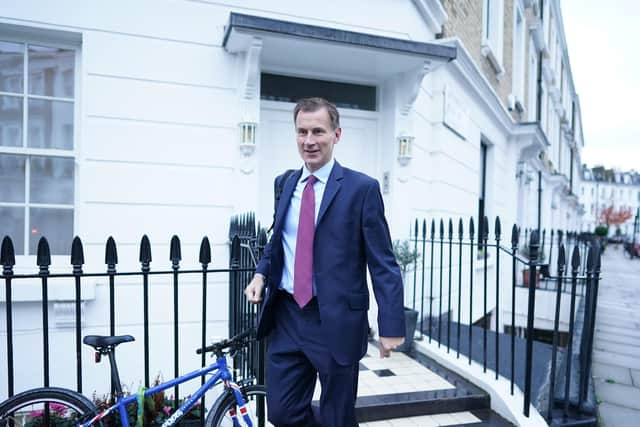Chancellor set to announce budget under huge pressure as inflation soars
The Consumer Price Index (CPI) was even worse than had been forecast, rising from 10.1 per cent in September, and higher than the 10.7 per cent that economists had predicted.
In response, Prime Minister Rishi Sunak said inflation was an ‘enemy we need to face down’.
Advertisement
Hide AdAdvertisement
Hide AdIt comes as chancellor Jeremy Hunt prepares to make his autumn statement at around 10.30am, with an estimated £55bn of savings needing to be found, understood to be from a combination of tax rises and spending cuts.


With an already-squeezed public sector facing significant inflationary challenges, pressure has been mounting on the chancellor to alleviate the strain.
Health and social care groups, education unions, local councils and even motoring organisations have all appealed to the chancellor for assistance.
In West Yorkshire, political leaders joined 70 Labour council leaders and elected mayors to ask for “urgent funding” to help people through the economic crisis.
Advertisement
Hide AdAdvertisement
Hide AdIn a letter to the Government, they said: “The critical services that councils run are in dire need of investment and without further financial support lives will be at risk.
“Without immediate action councils will need to make increasingly difficult financial decisions about the services we will have to reduce or stop altogether.”
Echoing the concern, the Local Government Association yesterday warned the scale of the budget gap was now so large, that “even if councils cut all spending on cultural and leisure services such as libraries, swimming pools, open spaces, waste collection and trading standards they would still not have saved enough money to plug the gap.”
In a sign of how widespread and varied the pressure on the chancellor is, the RAC also urged the Government not to raise fuel duty, arguing it would only push inflation higher.
Advertisement
Hide AdAdvertisement
Hide AdAdditionally, health and social care leaders ahead of what is expected to be yet another challenging winter have pressed their case.
Mike Padgham, chairman of the Independent Care Group said: “For the care of millions of older and vulnerable adults and the wider survival of the NHS it is vital that Mr Hunt addresses the crisis in social care tomorrow,” he said.
“When he was chairman of the Health and Social Care Committee, Mr Hunt said social care needed at least an extra £7bn a year just to stand still.
“We want him to remember that and to remember that this Government promised to fix social care in its 2019 manifesto. We must not be let down again.”
Advertisement
Hide AdAdvertisement
Hide AdThere are also concerns that soaring inflation is disproportionately affecting those who can least afford it.
The Office For National Statistics noted the poorest tenth of UK households witnessed the sharpest jump in the cost of living last month and the gap between inflation faced by the poorest and wealthiest UK households widened to its largest since 2009 due to poorer households spending a “greater proportion of their expenditure” on energy and food. The poorest 10 per cent were hit by a 12.5 per cent rise in their living costs for the month, while the richest 10 per cent experienced 9.6 per cent.
Rachelle Earwaker, Senior Economist for the Joseph Rowntree Foundation said: “The cost of living has millions fearing for the future, contributed to by soaring cost rises for food, transport and energy. Every day sees still more stories of people selling their possessions, or borrowing money at punishing interest rates, just to afford these essentials.”
